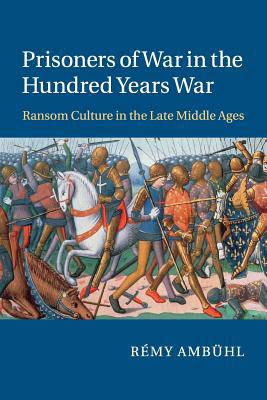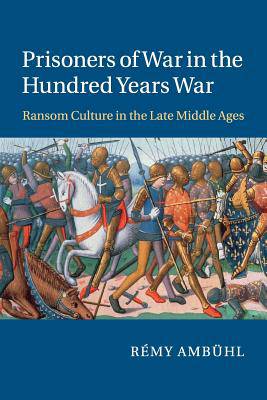
Door een staking bij bpost kan je online bestelling op dit moment iets langer onderweg zijn dan voorzien. Dringend iets nodig? Onze winkels ontvangen jou met open armen!
- Afhalen na 1 uur in een winkel met voorraad
- Gratis thuislevering in België vanaf € 30
- Ruim aanbod met 7 miljoen producten
Door een staking bij bpost kan je online bestelling op dit moment iets langer onderweg zijn dan voorzien. Dringend iets nodig? Onze winkels ontvangen jou met open armen!
- Afhalen na 1 uur in een winkel met voorraad
- Gratis thuislevering in België vanaf € 30
- Ruim aanbod met 7 miljoen producten
Zoeken
Prisoners of War in the Hundred Years War
Ransom Culture in the Late Middle Ages
Rémy Ambühl
Paperback | Engels
€ 60,95
+ 121 punten
Omschrijving
The status of prisoners of war was firmly rooted in the practice of ransoming in the Middle Ages. By the opening stages of the Hundred Years War, ransoming had become widespread among the knightly community, and the crown had already begun to exercise tighter control over the practice of war. This led to tensions between public and private interests over ransoms and prisoners of war. Historians have long emphasised the significance of the French and English crowns' interference in the issue of prisoners of war, but this original and stimulating study questions whether they have been too influenced by the state-centred nature of most surviving sources. Based on extensive archival research, this book tests customs, laws and theory against the individual experiences of captors and prisoners during the Hundred Years War, to evoke their world in all its complexity.
Specificaties
Betrokkenen
- Auteur(s):
- Uitgeverij:
Inhoud
- Aantal bladzijden:
- 316
- Taal:
- Engels
Eigenschappen
- Productcode (EAN):
- 9781107529304
- Verschijningsdatum:
- 1/10/2015
- Uitvoering:
- Paperback
- Formaat:
- Trade paperback (VS)
- Afmetingen:
- 152 mm x 229 mm
- Gewicht:
- 421 g

Alleen bij Standaard Boekhandel
+ 121 punten op je klantenkaart van Standaard Boekhandel
Beoordelingen
We publiceren alleen reviews die voldoen aan de voorwaarden voor reviews. Bekijk onze voorwaarden voor reviews.











